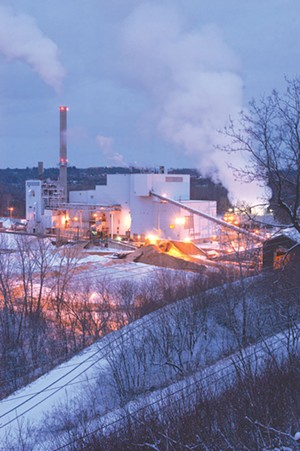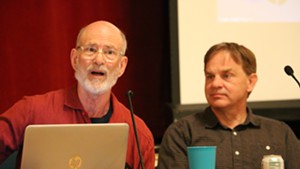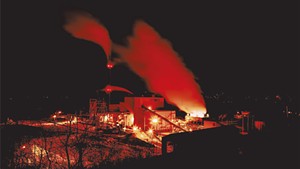
- File: Matthew Thorsen ©️ Seven Days
- McNeil Generating Station
Burlington voters are being asked this Town Meeting Day to accelerate the city's transition away from using fossil fuels to heat buildings. If they approve Question 2 on March 7, the city would begin charging a "carbon pollution impact fee" on new buildings heated with fuels such as oil or natural gas.
About a third of Vermont's greenhouse gas emissions comes from heating and cooling buildings. Reduction is viewed as vital for the city and state to meet their climate goals.
The proposed fee is intended to encourage developers to design buildings using renewable forms of heat, such as electricity or wood pellets. Large existing buildings — those over 50,000 square feet — could also be on the hook for the fee if owners replace an existing system with a fossil-fuel furnace. Dozens of buildings, including the University of Vermont Medical Center, UVM academic buildings and Market 32 shopping center on Shelburne Road, are large enough to potentially be subject to the fee. Smaller buildings would be exempt.
Mayor Miro Weinberger said the approach strikes a balance between meeting the city's ambitious goal of being a net-zero city by 2030 and keeping housing affordable.
The ballot question faces opposition from trade groups worried about the costs. Jim Bradley, a South Hero contractor and former head of the Vermont Builders & Remodelers Association, said he supports a thoughtful shift toward renewables, not the all-or-nothing approach of the "electrify everything" crowd.
"Let's walk toward a goal, not jump off a cliff," Bradley said.
Under the ballot provision, a new fossil fuel heating system would be charged an up-front permit fee of $150 for every ton of carbon it would be expected to belch out over its lifetime. In one example shared by city officials, a new large building with a $5.2 million natural gas heating and hot water system would face a one-time $600,000 impact fee.
Increases in the fee would be capped at 5 percent per year. Revenue from the fees would be used to help transition the city's fleet of gas-powered vehicles to electric ones and to establish programs that could help low-income residents afford cleaner heating sources.
Major environmental groups back the measure, yet some activists are concerned.
Burlington resident Nick Persampieri said he worries that voters will support the measure reflexively because it claims to be good for the climate. In fact, the city would be encouraging the use of biomass energy in the form of electricity generated by burning tons of wood at Burlington's McNeil Generating Station. Persampieri said that's a false climate solution.
"I think they need to be planning for the retirement of the McNeil plant and its replacement with clean, low-carbon sources, including wind, solar and geothermal," Persampieri said.
Instead of phasing out McNeil, however, the city is doubling down on its investment by seeking to capture the plant's waste heat and using it to warm large buildings — which would help owners of those structures avoid paying a carbon fee. The Vermont Public Utility Commission is considering a plan by the Burlington Electric Department and its partners to pipe steam from McNeil Generating Station to the Intervale Center and up the hill to the University of Vermont and the medical center. The estimated $40 million project is a scaled-back version of previous plans that date back to the 1980s.
Persampieri and others worry that investing millions in this plan would extend operations at a 39-year-old plant that may be nearing the end of its useful life.
Burlington Electric officials argue that the 453,470 tons of carbon emitted from the plant's towering smoke stacks in 2021 originated mostly from well-managed forests that have added 20 million tons of carbon over the past two decades.
Critics scoff at this contention, arguing that burning trees degrades a forest's ability to store carbon. Laura Haight, the policy director at the Massachusetts-based environmental group Partnership for Policy Integrity, said claims about biomass electricity's carbon neutrality have been thoroughly debunked.
"Whatever the net [greenhouse gas] uptake of forests was over the time period, it is less than it would have been if they had not been burning all that wood," Haight said.
Burlington Electric officials say that without McNeil, the city would be forced to purchase electricity largely generated from natural gas with far greater carbon emissions. They also note that capturing the waste heat would increase the efficiency of the plant. Further, they say, demand for new electricity in the future is expected to be met through solar and other renewables — not McNeil.












Comments
Comments are closed.
From 2014-2020, Seven Days allowed readers to comment on all stories posted on our website. While we've appreciated the suggestions and insights, right now Seven Days is prioritizing our core mission — producing high-quality, responsible local journalism — over moderating online debates between readers.
To criticize, correct or praise our reporting, please send us a letter to the editor or send us a tip. We’ll check it out and report the results.
Online comments may return when we have better tech tools for managing them. Thanks for reading.